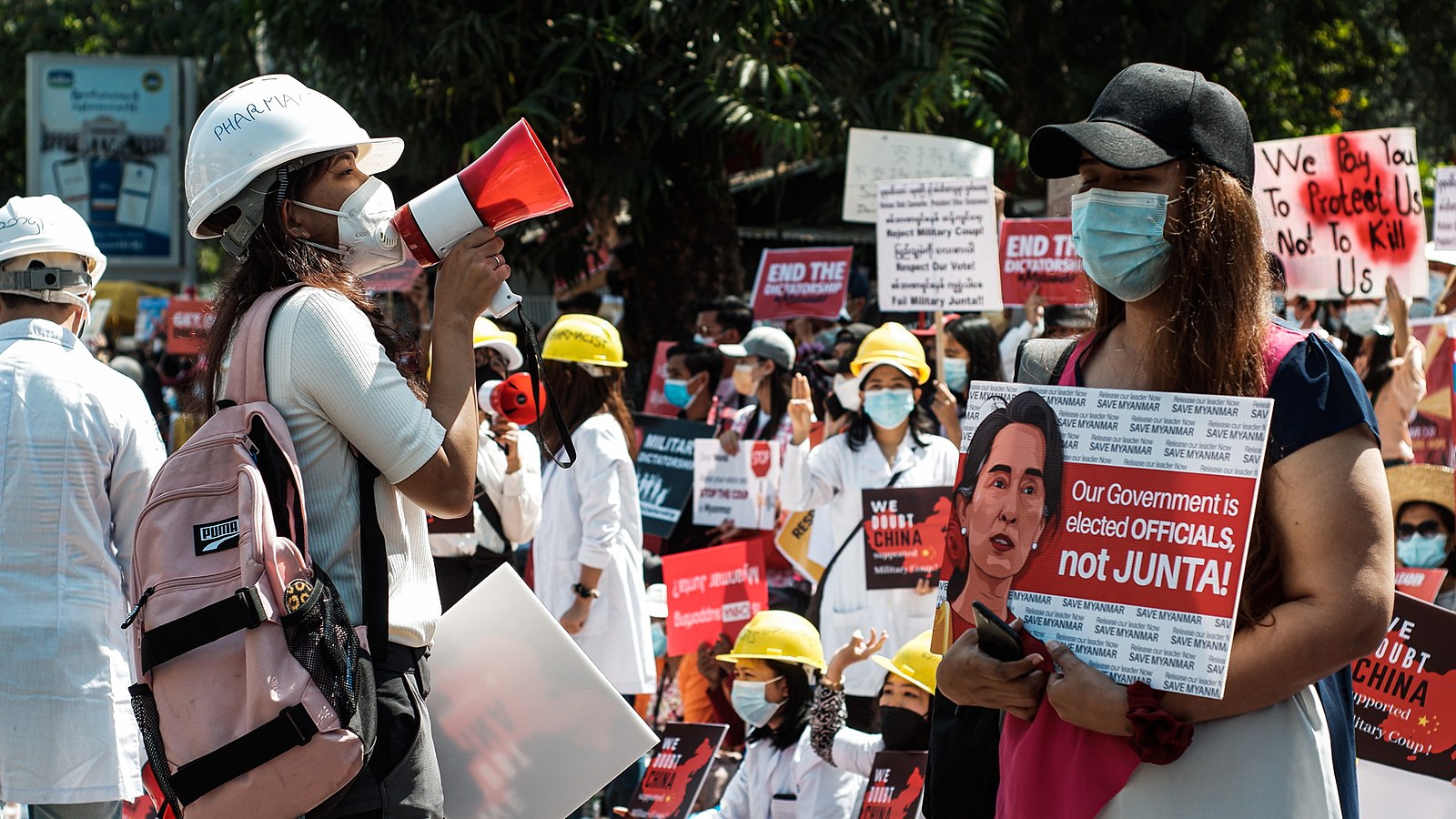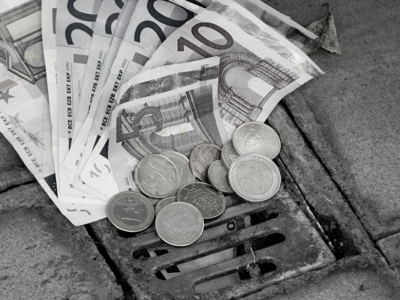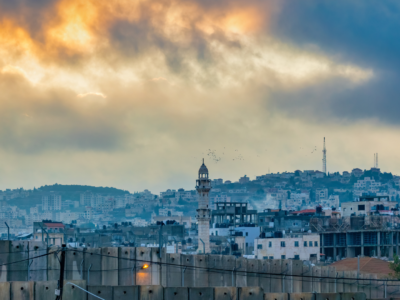Myanmar: a laissez-faire policy for a repressive regime returning

05/06/2021
Four months ago, the military overthrew the democratic government of Myanmar. On 1 February 2021, the country’s citizens saw how their feeble democracy, implemented in 2015, was shattered. The Tatmadaw, the Burmese armed forces, heirs of the Burma Independence Army created by General Aung San – father of the country’s current leader Aung San Suu Kyi — arrested the entire political cupola elected in the elections on 8 November 2020. The military establishment argued that there was possible electoral fraud.
It is not known whether the Tatmadaw expected the massive protests that have erupted over the months. Still, images of people on the streets protesting in favor of democracy have traveled the globe. In the early days, the army responded by blocking the Internet and with the police dispersing crowds. As time passed, the army’s brutality increased and deployed a systematized response. The military forces have come to suppress the protests with live ammunition. Since February 1, the Tatmadaw has murdered almost 800 people, of whom 52 were children. It has arrested about 5,000, according to the Association for Political Prisoners. Despite the systematic imprisonment of the leading dissenting voices and the closure of the media, the people of Myanmar have kept taking to the streets. The campaign of civil disobedience has not flagged. Evidence of the democratic commitment and determination of the citizens is the formation in mid-April of a National Unity Government (NUG), already declared a terrorist group by the Tatmadaw, in opposition to the self-proclaimed State Administration Council led by the military. In recent weeks, the Federal Union Army, a form of self-defense army to counter the violence of the Tatmadaw, has been set up.
The picture is still as uncertain as on day one of the coup d’état, but if one thing seems obvious, it is that this coup d’état very possibly means the end of Aung San Suu Kii’s political career, currently under arrest, along with her entire cabinet and the country’s president, Win Myint.
The Tatmadaw clings to power
The coup was unexpected but not a surprise. In fact, since the first democratic elections were held in November 2015, both the people and the international community, and regional powers could sense that the possibility of backstepping was real. The question then is whether during the last six years democracy in the country has really been a fact or an illusion since all this time the Tatmadaw has never let go of power. With the 2008 Constitution tailored to accommodate the military’s needs, until the coup the armed forces had, by law, 25% of the seats in Parliament. They also had control of three key ministries: Defence, Homeland security, and Borders; and what is perhaps most important: the power of veto on any initiative for constitutional reform.
The country’s Constitution allows the army to take power in the event of a state of emergency. This must be declared by the country’s president. That is precisely what happened on 1 February, when after arresting Aung San Suu Kyi and Win Myint, Vice-President U Myint Swe became interim president and signed the declaration.
Despite being unexpected, the coup has brought about several questions regarding the person in charge of the operation, General Min Aung Hlaing. About to retire, he is the head of the armed forces and well-known by the Burmese. He was one of the heirs of General Than Shwe, who was in charge of the country between 1992 and 2011, and one of the oppressors of the 2008 protests. In 2011, Shwe left power in the hands of Thein Sein, the country’s first civilian leader since the military seized power in 1962, but he looms large and is thought to be behind this coup.
Min Aung Hlaing is also known as the architect of the genocide of the Rohingya (Muslim Burmese) in the state of Rakhine, which captured the headlines of world media during 2017 when it went public and the United Nations labeled the events ethnic cleansing. Previously, the United States had already sanctioned him and his businesses during the years leading up to 2015.
One of the other questions raised over the last few months has been where the different peace processes agreed with the different guerrillas in the country will go. The country has a complex multi-ethnic fabric and dozens of open and latent conflicts, especially in the north of the territory, where it is not only the Rohingya minority that is suffering the systematic violation of human rights. In Kachinland for example, the Kachin (Christian minority) has been displaced for years and live under violence.
Over the last five years, Western governments and humanitarian agencies intent on defending the various peace agreements signed, have invested resources that have on some occasions been destined to repress the various insurgencies with the aim of ‘keeping the peace and supporting the government structures of ‘a ceasefire’. In other words, they have worked side by side with the military, the Tatmadaw, which was never purged. In 2015, the democratic government of the National League for Democracy (NLD) came with a promise of change that was never fulfilled. The professionalization of the Tatmadaw was a delusion which for those who knew the workings of the military from within was just unfeasible. The Burmese military forces have never been prepared to transform. Besides, there was no real intention on the part of the de facto leader of the country, Aung San Suu Kyi, to tackle the issue. She has often been apathetic regarding the systematic violations of human rights that her army has committed throughout the territory, especially those relating to ethnic minorities and insurgencies. This has caused her figure to lose international prestige and to have had several awards for peace revoked.
The West condemns the coup, but regional powers talk about ‘differences’
Over the hours that followed the coup, the various regional powers showed what their stance would be on the dictatorship until the next elections, scheduled to be held in February 2022, if nothing changes. The mildness of the condemnations of the coup was not a surprise: Singapore, the top investor in the country, claimed that it looked upon the situation “with grave concern”, but did not condemn the coup. Countries such as Thailand or Cambodia referred to the coup as “an internal affair”. For its part, Indonesia urged all parties to respect the constitutional government and encouraged “addressing electoral differences with the legal mechanisms available”.
At first, China, the regime’s prime patron prior to the 2015 elections and second-largest investor in the country, urged Myanmar to “resolve their differences”. In January 2020, prior to the global pandemic crisis, Xi Jinping had been in Myanmar to conclude a series of contracts. China remains the main destination for Myanmar’s exports.
The Chinese president’s relationship with the military establishment has always been cordial. For the time being, China has stated that it will be vigilant but will not take action. However, this laissez-faire policy could jeopardize its own interests, as occurred in mid-April, when some Chinese factories were set fire in a protest against Beijing’s passivity.
For its part, India, which borders Myanmar and is another of the major powers in the region, was somewhat more committed to the democratic government: “We believe that the rule of law and the democratic process must be maintained,” it initially assured. The reality is that over these months New Delhi has avoided the conflict. India, like China, is interested in maintaining good bilateral relations with Myanmar, not only on border issues but because Myanmar is one of the important members of the Bay of Bengal Initiative for Multi-Sectoral Technical and Economic Cooperation (BIMSTEC). Myanmar is part of China’s plans to become a stronger economy and has a great interest in its stability. Over the past few years it has been training Tatmadaw units and both armies have conducted joint operations, especially in border areas.
The firmest condemnations of the coup came from Western powers such as the EU or the United States. Over the months, the latter has reactivated a series of sanctions against the main leaders of the Tatmadaw and their businesses (mostly in precious gems and mining). Some of the sanctions predate the coup, due to the situation in the state of Rakhine with the Rohingya.
The controversy during the first few days was led by the United Nations Security Council: it was unable to use the expression “coup d’etat” at the request of China and Russia. That was the main reason why it took them longer than usual to make a public statement.
Recently, several human rights groups have called on the United Nations to implement an arms embargo on the Tatmadaw, but the UN General Council knows that it will be faced with the veto of China and Russia. “China expects the relevant parts of Myanmar to remain calm and moderate, to act in the fundamental interests of the people, to address their differences through dialogue and consultation within the constitutional and legal framework, and to continue to advance in the democratic transition. The immediate priority is to avoid conflicts and bloodshed, de-escalate the situation and reduce tension as soon as possible,” said the Chinese UN ambassador Zhang Jun, recently in this regard.
If there was an organization capable of getting the Tatmadaw to revert its decision, that was the Association of Southeast Asian Nations (ASEAN). It first called for an end to violence by the army and the reduction of tensions, and then a five-point route was proposed to reach an understanding. The key demand was the immediate cessation of violence in the country.
At the summit held in Jakarta, these five points were presented along with a request for the release of all political prisoners. The summit was attended by General Min Aung Hlaing himself, the first trip made abroad since 1 February.
With regard to international order, we will have to see where US foreign policy heads with the new Biden-Harris administration and what China’s position will be over the next few years to ascertain whether there is ideological confrontation. In relation to Myanmar, Biden may focus on the country as Obama did during his first term, characterized by a Pivot to Asia piloted by Clinton which never quite worked. At the time, in 2012, the United States was the leading guarantor of Myanmar’s democratic turn and American leaders were among the first to visit the country and to endorse the transition. The United States was mainly interested in having an ally in the area at a time when China’s economy was growing at 9.2%.
When Obama’s second term of office was inaugurated and John Kerry was appointed Secretary of State, Myanmar was sidelined and the United States’ foreign policy looked back to the Middle East. It was then that China again took advantage to show its muscle in the country, which it had never really left.
We will have to wait for the next few months to see to what extent the repression continues or whether the situation stabilizes, but for the time being, it does not seem that over the next few weeks the scenario will change too much. What does seem obvious is that the economy will suffer, because it has already started to do so. Fitch Solutions has already seen that during this year the country’s economy could contract by up to 20%, certainly bad news for one of the least developed countries in the world.
Queralt Castillo Cerezuela is a freelance journalist and Ph.D. candidate in International Relations, specializing in ethnic reconciliation in Myanmar.
The opinions expressed in this publication are those of the authors. They do not purport to reflect the opinions or views of the CGI or its contributors. The designations employed in this publication and the presentation of material therein do not imply the expression of any opinion whatsoever on the part of the CGI concerning the legal status of any country, area or territory or of its authorities, or concerning the delimitation of its frontiers.


